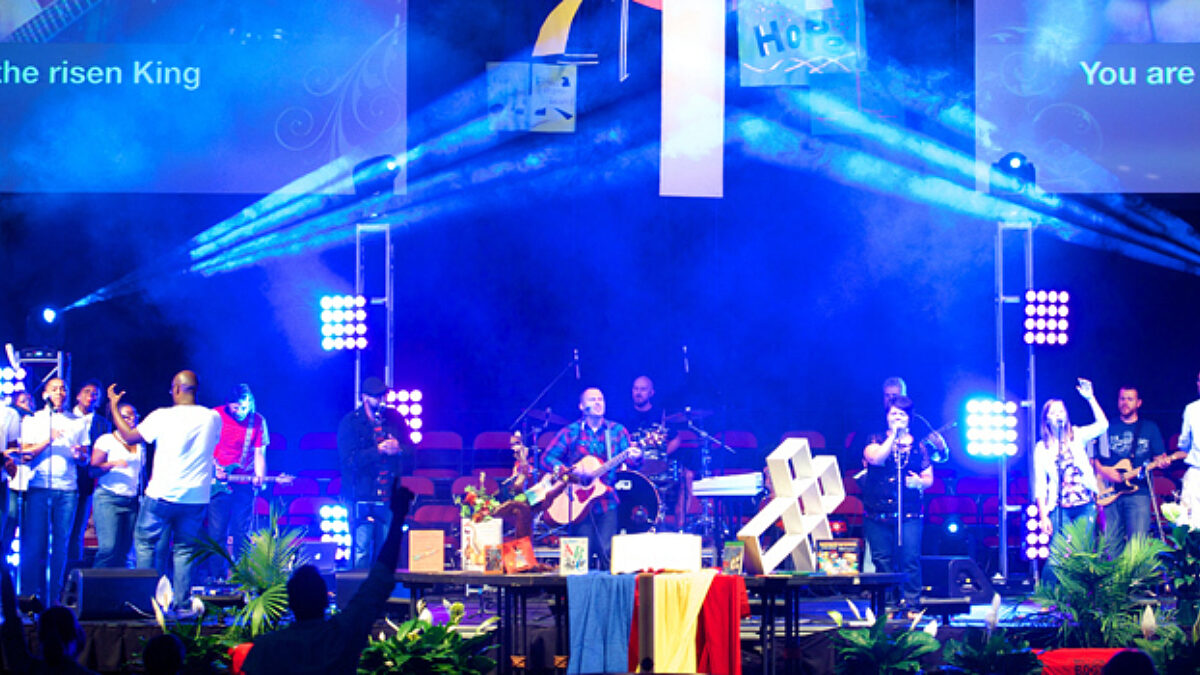
‘In the Beginning was the Word’
By Jessica Connor
FLORENCE—“Is you the one? That’s right—I said, is you the one? Is you the one that we been waiting on? Is you the one that’s gonna make everything all right?”
With those words echoing as a theme throughout the right, the Rev. Tiffany Knowlin preached a praise- and amen-filled sermon capped with a house-wide standing ovation Tuesday at Annual Conference leading the body in a worship celebrating young adults, service—and embracing those in the Corridor of Shame for God.
In a service led by the Rev. Jonathan Tompkins, with music from the Rev. Scott Johnson’s acclaimed band My Dear Demas and the Claflin University Gospel Choir,
Knowlin pulled from John 1:43-51.
In the passage, Philip tells Nathanael “We have found the one,” the Messiah, but when Nathanael heard Jesus was from a tiny insignificant town, Nathanael scoffed, “Nazareth? Can anything good come from there?” Philip simply urged him to come and see. When Nathanael did finally encounter Jesus, he saw, and pronounced, “Rabbi, you are the Son of God; you are the king of Israel.”
Knowlin told her own story of growing up what she called “a low black woman” in Marion, deep in South Carolina’s Corridor of Shame, an impoverished area along I-95 where schools are notoriously underfunded and often failing and where the local economy is slowing grinding to a halt. Knowlin, however, learned to love books at a young age, and thanks to strong parenting and the mentorship of her elementary school principal, she not only went on to college but is today a community leader and speaker and the dynamic and well-known pastor of College Place United Methodist Church, Columbia.
“Nazareth is like Corridor of Shame,” Knowlin told the crowd. “And tonight, as I consider these places, these seemingly irrelevant and insignificant places, ... I can hear Nathanael say, ‘Can anything good come out of Marion County? Out of Williamsburg Dorchester and Clarendon counties?’”
She challenged the crowd to think, as they collect books for children in poverty through the conference’s Million Book Effort, not only to give to the children there but to actually go there, form partnerships with schools or agencies and actually meet some of the children in those schools.
“What might happen if we take Philip’s invitation to ‘come and see’ the places that make up the Corridor of Shame?” she asked the crowd to resounding applause. “I wonder what might we discover? Because maybe, just maybe, there is something or there is someone that we need to know. Someone that has been waiting for us. We don’t know who it is that God is gonna rise up. There many be a little child in a school in Allendale that might be the next president of the United States. There might be the next bishop of The United Methodist Church. And someone is teaching them that old story that you might have life and have it abundantly.”
While United Methodists do a good job of giving things to poor children, these children need more than mere politeness across racial and economic lines, Knowlin said. If we are truly going to be the body of Christ, we need to go there, do more than just collect books or give money.
“And not ’cause we’re such good people, not even because it is the right thing to do. We gotta go and see…because God cares about His suffering people,” Knowlin preached to cheers, stomps, whistles and claps.
A long time ago, her principal was compelled to “come and see” her, to mentor her, to take a chance and help her rise up from a poor area to be all she can be for Christ. We need to do the same.
“There are places to come and see all over the state—children and youth and others who need someone to come and see, come and invest come and take the time to know them,” Knowlin implored.
We have to go and see because Jesus is waiting for us there, in the eyes and hearts and souls of the poor, the weak, the orphaned, the widowed.
“Jesus is in Marlboro and Bamberg and Jasper and all of the 17 counties that make up the Corridor of Shame, and Jesus has been transforming and redeeming the lives of these seemingly irrelevant people and lives for a mighty, mighty long time,” she said.
So yes, let us give books to these children—and also pray and eat with them, hear their stories and build relationships with them.
“We cannot be all God calls us to be without them,” she said. “I ask you: Is you the one? Is you the one that will come and see?”
The worship service also featured a collection for campus ministries across South Carolina.